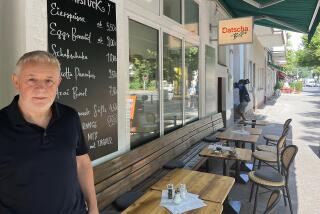11,000 East Germans Await Late Trains : Another Night in Muddy Prague
- Share via
PRAGUE, Czechoslovakia — About 11,000 East Germans, in hurried flight from their homeland, were set Tuesday night to board trains for a new life in West Germany. But the special trains, to come from East Germany, did not arrive in Prague, and the crowds faced another night in the streets and encamped in the muddy backyard of the West German Embassy here.
Early in the evening, embassy officials announced to an exultant crowd the news that another deal had been struck between Bonn and East Berlin, similar to the arrangement that allowed about 6,000 refugees to leave here last Saturday night, and that the first trains would be pulling out about 8 p.m.
But the confusion that has prevailed here for the last week continued, as neither the embassy nor railway police could offer an explanation for the trains’ failure to appear.
In the meantime, the narrow streets approaching the West German Embassy were jammed with mostly young East Germans, including an estimated 1,500 small children, trying to stay warm and catch a few minutes of sleep on the cold cobblestones.
Sanitation Problems
Movement on the street was virtually impossible. In the past 24 hours, at least 6,000 new arrivals have gathered outside the embassy--which was closed on demand of Red Cross officials worried over growing problems of sanitation.
The tent city that has been erected on the embassy’s large garden grounds was occupied by at least 4,500 people, and, the diplomats said, it became impossible to squeeze in more newcomers.
Inside the embassy, a huge baroque palace, makeshift bunk beds were full of sleeping children, the hallways crowded with refugees sleeping with their heads on their knees and refuse and duffle bags scattered in ornate drawing rooms. At the windows, people peered out at the crowds below, waiting for the word to leave.
Embassy officials said they assumed that the trains’ delay was due to “technical reasons” but hinted at the possibility that the East German government--in what it obviously hopes will be the last time it will face this problem--was simply taking its time with the trains and pointedly not worrying over the discomfort of its defecting citizens.
There was also speculation that the delay might have been suggested by the Czechoslovak government, in the hope that it would give time for any East German in the country to get to the embassy and catch the last train out.
East Germany on Tuesday began requiring special permission for its citizens to travel to Czechoslovakia.
“I am very happy I got out in time, just in time,” said Angela Jungebauer, 31, a high school teacher. “I am so happy I cannot describe it. My husband is working in West Berlin, and I have been trying to get out in the normal way for two years. I just had no patience any more.”
“We are just fed up,” said another young man, cradling his sleeping 3-year-old daughter in his arms. “You know it is not easy to leave the country where you were born, your town, your family. But there is no future there, no chance for my children.”
Many of the refugees, while not involved in politics or opposition movements, cited East Germany’s hard-line attitude toward political reform--now moving forward rapidly in Poland and Hungary--as a primary reason for leaving. Most of them, they said, had apartments, cars and jobs. But, as a hospital technician from Leipzig said: “We have no freedom. We are frozen, our politicians are frozen.”
It is uncertain whether the dramatic exodus, begun Sept. 11 when the first of about 25,000 East Germans took advantage of Hungary’s decision to lift its border barriers with Austria, will bring an end to East Germany’s socialist ice age. But the events are a clear embarrassment to the regime of 77-year-old Erich Honecker, who will preside this weekend over celebrations marking the 40th anniversary of the German Democratic Republic.
Soviet President Mikhail S. Gorbachev, who has been scolded by Honecker for his reformist inclinations, will attend the celebrations and is expected to discuss the refugee issue with the leadership. Soviet Foreign Minister Eduard A. Shevardnadze was a key participant in negotiations with the East and West Germans last week.
The Czechoslovak government, an equally hard-line regime, has been sympathetic to the plight of the East German government, and has reacted with evident confusion over the refugees.
After the first exodus on Saturday, police were sent to ring the West German Embassy to prevent more East Germans from entering the compound. By turns, they held back the crowd and then relented to let small groups enter, sometimes backing off when faced by the ambassador, Hermann Huber, or members of his staff.
But within hours of the departure of the first group, 200 more East Germans managed to elude the Czechoslovak police and scale the wrought-iron fence of the embassy’s garden. As more continued to arrive, the Czechoslovak police by turns allowed some to enter and attempted to arrest others. By Monday night, there were between 3,000 and 4,000 inside the embassy grounds, and Tuesday morning, with the crowd outside steadily swelling, the police simply pulled back.
Among the crowd, the mood was weary but civilized. Volunteers passed though the throng handing out apples and hot tea. Some Czechoslovaks, fascinated by the spectacle, came out to watch. Some brought candy for the children, and a few offered rooms in nearby apartments to parents with small children.
Most of the emigrants, however, stayed stoically in place Tuesday night. The crowd parted once to let an ambulance pass--it had come to pick up a woman in the early stages of childbirth. The youngest child in the throng was said to be 15 days old.
One young mother, rocking a pram back and forth, said her baby was 5 weeks old. The mother, smiling still at the news that buses would soon take them to the train station, said everything was fine. Her baby was sleeping and wrapped in warm blankets. “She’s got the most comfortable bed here,” she said.
More to Read
Sign up for Essential California
The most important California stories and recommendations in your inbox every morning.
You may occasionally receive promotional content from the Los Angeles Times.













